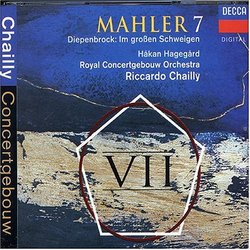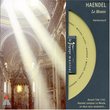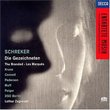| All Artists: Håkan Hagegård, Alphons Diepenbrock, Gustav Mahler, Riccardo Chailly, Royal Concertgebouw Orchestra Title: Mahler: Symphony No.7/Diepenbrock: Im Grossen Schweigen Members Wishing: 0 Total Copies: 1 Label: Polygram Int'l Release Date: 3/13/1995 Album Type: Import Genres: Pop, Classical Styles: Vocal Pop, Symphonies Number of Discs: 2 SwapaCD Credits: 2 UPC: 028944444629 |
Search - Håkan Hagegård, Alphons Diepenbrock, Gustav Mahler :: Mahler: Symphony No.7/Diepenbrock: Im Grossen Schweigen
 | Håkan Hagegård, Alphons Diepenbrock, Gustav Mahler Mahler: Symphony No.7/Diepenbrock: Im Grossen Schweigen Genres: Pop, Classical
![header=[] body=[This CD is available to be requested as disc only.]](/images/attributes/disc.png?v=15401716) ![header=[] body=[This CD is available to be requested with the disc and back insert.]](/images/attributes/disc_back.png?v=15401716) ![header=[] body=[This CD is available to be requested with the disc and front insert.]](/images/attributes/disc_front.png?v=15401716) ![header=[] body=[This CD is available to be requested with the disc, front and back inserts.]](/images/attributes/disc_front_back.png?v=15401716) |
Larger Image |
CD DetailsSimilar CDs |
CD ReviewsMahler 7 with Chailly Kevin | Davis, CA United States | 03/07/2002 (5 out of 5 stars) "Where most interpretations of Mahler's 7th Symphony are overtly passionate and often over the top, Chailly takes a different approach. He brings his usual care and nuance to the texture and melodic line, but he also uses a much slower tempo. Having heard live performances by various artists and almost every recording of this piece, taking a slow tempo is disastrous for every conductor. Every conductor, save Chailly that is. His tempi are slower, but he does not sacrifice one ioda of excitement. If anything, there is more exciting since he is so skilled at manipulating the tension of harmony and melody.The playing of the Concertgebouw is first rate." Comparison: Abbado, Chailly, and Bernstein Johnson Lee | Irvine, CA USA | 04/25/2007 (5 out of 5 stars) "I hardly thought I would love the 7th as much as I had loved Mahler's other symphonies such as 5th or 9th. Recently, however, it has become my very favorite. I am now fascinated by its exotic micro-cosmos, colorful sonic spectrum and exotic instrumentation. I am enchanted by its dreamy qualities, nightmarishness and all. Most of all, it's an immensely entertaining piece of music that never shoves any sort of purposefulness in your face. As of now this is my most favorite of all Mahler symphonies.
The three recordings I've been enjoying recently are Abbado's with Berlin Phil, Chailly's for Decca, and Bernstein's DG recording. The most distinct quality of Abbado's is the dark, veiled sonority of the Berlin Phil. It conveys the mysteriousness that is so characteristic of this piece. As far as the interpretation goes, Abbado doesn't linger on very much. But he does conjure up all the nuances in the music through exquisite phrasing and subtle rubati. The details have been illuminated with utmost craftsmanship but Abbado never loses sight of the representative mood of each movement. However, I would say the unique orchestral color is the main attraction here more so than the interpretative decisions. The one word that might summarize Chailly's version is detachment - and that's not necessarily a bad thing for this music. His rendition sounds as if you are looking at a series of surreal events from a distance. You're not the person who is dreaming all these bizarre moments. Instead you're watching someone who is. A part of it may be due to the fairly far-mic'ed recording. But it's also because of Chailly's choices in phrasing and tempi. You won't find any trace of rhetorical gestures here. Chailly's is the embodiment of coolness. He and his Concertgebouw crew play up the details as much as Abbado and Berlin Phil do but they sound more like careful observations than involvements. Although this is not the most engrossing kind of performance, it contains some fascinating interpretative insights plus truly shattering climaxes with the percussions captured in full range. The ending is particularly impressive. Predictably, Bernstein offers the most personalized vision. Here every note matters, which can never be said in Chailly's case. Bernstein injects his personal emotion (and sometimes opinion) into every bar. Lyrical moments are bittersweet. Nightmares are terrifying. The last movement is full of rhetoric that you would have a hard time finding in other performances. This is the version that most fullly exploited this enigmatic work. The downside is, well, it doesn't sound like an enigma anymore after being presented in such a specific way. Everything is stated and nothing is implied. There's little room for listener's own interpretations of the music. Still, it's a small price to pay for arguably the most gripping account of the 7th. Then what's the choice? If you had read my comparison reviews on Beethoven's late piano sonatas (Brendel vs. Rosen) or Haydn's London symphonies (Jochum vs. Davis) you should be able to guess my recommendation. I wouldn't want to live without any of the three. But if I am forced to choose one, I would go with Bernstein's. As shown in many of the Mahler recordings he made, he simply loved this music more than others did. " |

 Track Listings (2) - Disc #1
Track Listings (2) - Disc #1

